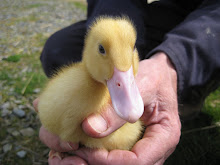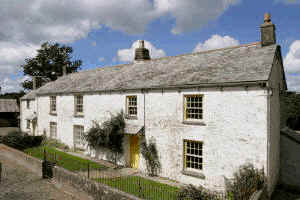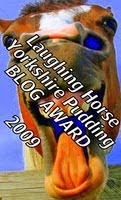 Spent lunchtime at a dispersal sale of a herd of organic pedigree Red Ruby Devons. They were being sold from the Fishleigh Estate where the much debated Springwatch is held. It's all part of my bovine acclimatisation process - cow speak being so very different from the more familiar pig and sheep lingo. I now know that a heifer becomes a cow on the birth of her second calf, that a steer is a castrated male, and a bullock still has his bits. I think.
Spent lunchtime at a dispersal sale of a herd of organic pedigree Red Ruby Devons. They were being sold from the Fishleigh Estate where the much debated Springwatch is held. It's all part of my bovine acclimatisation process - cow speak being so very different from the more familiar pig and sheep lingo. I now know that a heifer becomes a cow on the birth of her second calf, that a steer is a castrated male, and a bullock still has his bits. I think.I was supremely impressed by the auctioneer. Extremely knowledgeable about cattle, the breed, and the provenance of the specific animals and most of the purchasers, he positively hummed with the required wisdom. His introduction showed that he had been preparing for this event, and there were all his peers watching him perform, determining whether they would sell their stock through him at some future point.
The estate stockman brought each lot into the ring, some individually, others with a calf at foot, adding a few words of insider wisdom for the occasional animal. It must be heartbreaking for him to bring to sale a herd he has cared for and developed.
We stood on trailers, six deep, hopping from one foot to t'other to glimpse between bunched shoulders the particulars of each animal - its confirmation, the clearness of its eye, it's breeding potential. I couldn't see why one cow went for over £1600 when another the same age went under the hammer for less than £500. Perhaps her teats were compromised - I couldn't tell from where I stood.
The auctioneer was miked and clear-voiced, the bidders discreetly nodding their catalogues or touching the brims of their caps. I didn't take a photo - I was worried it would be mistaken for a bid. I couldn't stay long, but I swallowed the essence.
Events like this are supremely English. There is a shorthand, a modus operandi, a complete sense of familiarity for those in the club, and an utter confusion for those unacquainted. And a key part of this mystique is that of course the lots were sold in guineas.
What's that all about? You bid, say, a thousand of these babies and have to part with £1050 (and possibly a buyers premium depending on the auction). Where else outside the auction house does a non existent coin of the realm become the accepted currency? Why not shekels or zlotys, or to keep with the English theme, groats?
I like the idea of paying with gold ingots, topped up from leather bagged gold dust to reach the required weight. It goes with my idea of Wild West ranchers, and that's not too far a leap from West Country farmers; one of the chaps there WAS wearing a leather cowboy hat.

















9 comments:
Mopsa - I have to admit that I thought a heifer became a cow after she had calved; you are right though - i had to look it up! Doh - and I should have known that!!
Are you going to put in a bid at the next Devon auction then? How exciting....
Your life's a guinea a minute!
cow vernacular coming on a bundle – tho’ hope it’s not inappropriate for me to say that a bullock still has no balls, it’s a youngster, turning into an ox when fully grown. and to make it even more confusing a field full of ‘bullocks’ can be, and most probably are, a group of mixed sex youngsters. even more baffling cows, heifers, bulls, steers, bullocks and calves, m & f, are all referred to as ‘he’ or ‘him’…good luck!
Not yet, Hannah - but I'm trying to get my head round the words and the concept in preparation.
WW - and there was me thinking it was a farthing, tops! Ta.
Paula - it is a confusing world of bovine words - what is the difference between a steer and a bullock? I feel myself sinking and I so want to swim. I need all that luck. Will keep my eye on your blog for continued insight.
That picture of a guinea fowl took me straight back to my childhood on a Devon farm. We had guinea fowl (which we called by the old Devon name pronounced 'glaynies') and bantams (banties). I love auctions - as you say, so English!
nothing, mopsa, they are in essence both castrated males. ‘bullock’ is more generic tho, and so ‘look at that there field of bullocks’ is most probably referring to both steered (hence ‘steer’) males and females youngsters. In local vernacular single sex groups can be referred to as bullocks too. I haven’t heard young bulls referred to as bullocks, tho maybe you have and so the confusion, in which case ‘bullock’ would be being used similarly to ‘hogg’ or ‘hogget’ in sheep.
Totally confused now? Think I may be!
And I thought you were going to talk about guinea fowl. Ah well. I cooked one last night and it was delicious, with mashed potato and puy lentils.
Fascinating to follow the story, learning agrisnippets as we go. Looking forward to the next installment!
Oh god, only now do I actually read the heading properly!
Paula - I like the confusion somehow - that there is lots to learn and no one answer is something of a philosopher's feast I guess.
Rob - yes, I love guinea FOWL too and have reared them for meat several times, though not yet in Devon as you need a large pen with a netted roof and creating tat is nowhere near the top of the to do list! (and I apologise for the titular pun).
Post a Comment